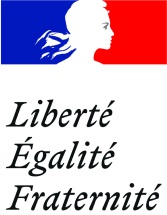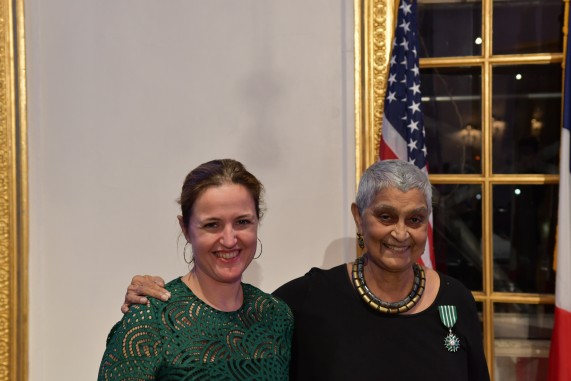On Thursday, December 7, Gayatri Chakravorty Spivak was named Chevalier of the Order of the Arts and Letters in a ceremony held at the Cultural Services of the French Embassy in New York. Cultural Counselor Bénédicte de Montlaur bestowed the insignia upon Spivak for her extensive career as a scholar and teacher dedicated to expanding global dialogue.
Good evening!
As Cultural Counselor, it is my pleasure to welcome you here to the Cultural Services of the French Embassy to bestow the insignia of Chevalier of the Order of Arts and Letters upon Professor Gayatri Chakravorty Spivak.
The Order of Arts and Letters (Ordre des Arts et des Lettres) was established in 1957 to recognize eminent artists and writers, as well as people who have contributed significantly to furthering the arts in France and throughout the world.
Professor Spivak, we are here tonight to honor you as one of the most widely recognized scholars of our time. Your work in postcolonial theory, feminism, education, and philosophy is remarkable, and you are distinguished among your peers for your unwavering dedication to promoting marginalized voices through a self-critical approach of our current systems. Your remarkable career as a scholar is as vibrant now as ever, and you continue to be a crucial voice in global dialogue, as other scholarships and specialists from a wide-range of fields turn to you for your opinions. Just this past November, for example, you were a keynote speaker at the 50th International Association of Art Critics Congress at the Pompidou Center in Paris, sponsored by the French Ministry of Culture.
Dear Professor Spivak:
Your resume is notoriously over forty pages long—so where do I begin? Perhaps I’ll begin with your education. After receiving your Bachelor’s degree at the University of Calcutta in 1959, you borrowed money and bought a one-way ticket to the United States. You ended up at Cornell University somewhat by chance. As you like to tell the story, you chose Cornell because you had only heard the names Harvard, Yale, and Cornell, and you thought Harvard and Yale were too good for you. At Cornell, you earned your Master’s degree in English and your Ph.D. in comparative literature, studying under Paul de Man. Perhaps now that 11 universities across the globe have granted you an honorary doctorate, including the Université Paris 8 – Vincennes à Saint-Denis and l’Université Paris X Nanterre, you have overcome your youthful diffidence when it comes to prestigious academic institutions.
You taught at the University of Iowa and the University of Chicago among other universities before coming to Columbia in 1991 as Avalon Foundation Professor in the Humanities. In 2007, you were named University Professor at Columbia University, making you the first woman of color in the university’s 262-year history to receive this title, the highest rank of professorship. You were named University Professor in recognition for your dedication to the university’s community as well as to the broader global community.
Mixing the broader global community into a university community is something toward which you have always worked. In 1998, responding to a need to open comparative literature beyond European languages while offering rigorous training in traditional methods, you founded the Institute for Comparative Literature and Society with your colleague Andreas Husseyn. The institute promotes cross-disciplinary and cross-regional approaches, and beyond the work of a traditional comparative literature department, the Institute emphasizes the social sciences, bringing to the forefront of its study the modern world’s globalized nature. The institute reflects your vision for more global dialogue.
But let’s back up: before achieving the highest ranking title at one of the country’s best universities, you were a young ambitious scholar working as an assistant professor at the University of Iowa. It is during this period that you came to be more widely known through your translation and your monograph-length introduction to Jacques Derrida’s “Of Grammatology,” which you published in 1976. You were 25 years old, and you decided to order Jacques Derrida’s book “Of Grammatology” because you were in the habit of ordering unusual books from a catalogue to keep yourself intellectually engaged. You were not a native French or English speaker, and you had never been formally trained in philosophy, yet what resulted from this decision to order that book was a lauded translation accompanied by a groundbreaking introduction. Derrida was not yet a household name in America, but with your translation you effectively introduced the English-speaking public to his work and turned scholars to his practice of deconstruction.
In fact, you somewhat inadvertently became an authority on French thought, with publications like Yale French Studies asking you to write on French feminism and Critical Inquiry asking you to author a work on deconstruction. Since your initial translation, you have translated various other French authors and have written on French feminism. This somewhat unintentional authority on these Western subjects put you in a position where you could approach traditional texts through deconstruction—as an authority on canonical European texts, you are able to approach them with critical intimacy, and turn around the traditional readings of Western philosophy.
You published your groundbreaking piece, “Can the Subaltern Speak?”, in 1988, which transformed the way that scholars approach the study of Postcolonialism. This essay, using deconstructionist methods, analyzed the factors that prevent the “subaltern” from being heard. Since then, your work on the “subaltern,” a postcolonial term which denotes the population excluded from established power structures, has ushered in a new era of Postcolonial thought.
Through your work as a prolific scholar and author, you constantly engage audiences to think critically and beyond traditional ways. We were very honored that you took part last January in the Night of Philosophy and Ideas, an event that we at the Cultural Services of the French Embassy co-presented with the Brooklyn Public Library. During this 12-hour marathon of philosophical debate, performances, screenings, and installations, you engaged the large crowd with a talk about the idea of borders in today’s world. In this event lasting from sunset to sunrise, you truly engaged in your idea of practicing philosophy. And we are thrilled and grateful that you have confirmed your participation in the next Night of philosophy and Ideas, that will be held on Saturday January 27th at the Brooklyn Public Library.
Through all these years of incredibly hard work and dedicated scholarship, you credit your parents with much of your success. Your father, who you call a “proto-feminist,” died when you were just thirteen. Your mother, a “feminist”—not “proto”—was an intellectual and read all of your work during her lifetime. Your childhood was marked by the Partition of India in 1942 and the Calcutta Killings of 1946. Your mother, a social worker, would leave before sunrise to go to the railway station and help refugees. In their memory, you established the Pares Chandra and the Sivani Chakravorty Memorial Foundation for Rural Education in 1997. In 2012, you were awarded the Kyoto Prize in Arts and Philosophy, a prize nicknamed “the Nobel for the humanities,” and you donated your cash prize to your foundation. Not only have you been funding schools in West Bengal since 1986, but you also travel to India multiple times a year to work with the students and teachers. Just as you do as a professor in the United States, you prepare these students in West Bengal with a rigorous education, with the hope of preparing them for secondary school despite the additional challenges of illiteracy and poverty.
In your prolific career, you have earned many titles, from “philosopher theorist” to “Marxist-feminist scholar” to “rock star goddess of postcolonial studies.” And while you may not agree with all of them, these do describe, to a certain extent, the way that your work is centered on the idea of “theory and praxis.” You are one of the sharpest scholarly minds of your generation, but your work goes beyond the philosophical and the theoretical.
So you have spent your life not only studying the silenced voices of the subaltern, but giving them a voice through education. As an exceptional global scholar, you have challenged old ideas and pioneered new ways of thinking about colonialism, democracy and literature. You will be receiving the MLA’s Lifetime Scholarly Achievement Award in January in recognition of your remarkable career as a scholar. You have internalized your theory as a scholar and it has innately become a part of your practice to educate and elevate voices. For these reasons, it is my honor to present you with the Order of Arts and Letters.
Gayatri Chakravorty Spivak, au nom du gouvernement français, je vous fais Chevalier dans l’Ordre des Arts et des Lettres.



